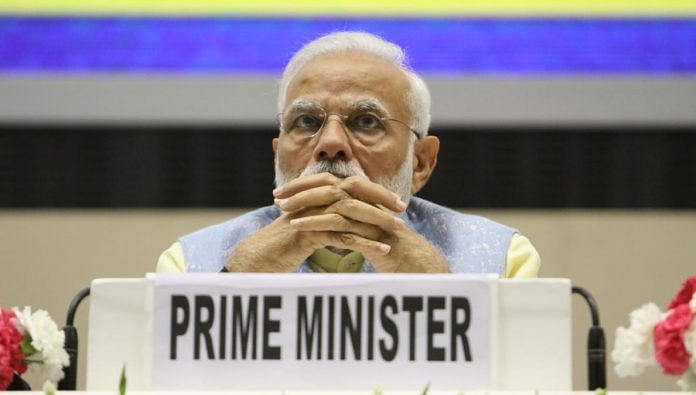New Delhi: The Narendra Modi government gave a fresh push to the proposed All-India Judicial Service (AIJS) in June this year, writing to the chief secretaries and high courts of states seeking their opinion. But just three months ago, the government had thought there was “no consensus” about the AIJS among high courts.
In March, the Project Sanctioning Committee of the Ministry of Law and Justice had met to consider research and project proposals received under the ‘Plan Scheme for Action Research and Studies on Judicial Reforms’. One of the proposals it considered was from the Vidhi Centre for Legal Policy on ‘Consolidating the discourse on All India Judicial Service’.
However, the ministry stated that the committee, after deliberations, “did not approve the proposal as there is no consensus of high courts on the subject”.
ThePrint has accessed the minutes of the meeting in question, chaired by Dr Alok Srivastava, the justice secretary. The committee considered 18 projects for approval, of which eight were rejected.
However, when Ravi Shankar Prasad assumed office as the Union Minister of Law and Justice for the second time in early June, he said the AIJS was on the anvil. The letter sent out by his ministry just a few weeks later to chief secretaries of states and high courts asked them to “furnish views, comments, observations at the earliest” about creating an AIJS. The ministry has based its proposal on an earlier recommendation from a chief ministers’ conference in 2013.
ThePrint sent a detailed questionnaire to the Ministry of Law & Justice, asking among other things why it changed its mind in three months. But the questionnaire remained unanswered.
Also read: Lawyers’ body moves SC against Modi govt for not elevating judge ‘disliked’ by PM, Shah
What is the proposed AIJS?
It has been over 61 years since the idea for an All-India Judicial Service was mooted by the Law Commission of India.
The AIJS would see district judges recruited centrally through an all-India examination and allocated to each state, along the lines of the Indian Administrative Service.
A committee of secretaries chaired by the cabinet secretary had given a green signal to the idea of the AIJS in November 2012. Until 2016, 15 states and 18 high courts (out of 24) had responded to the proposal.
Why there’s no consensus in high courts
In November 2016, then chief justice of India T.S. Thakur had met the chief justices of all high courts to “convince” them to adopt the central exam.
But according to sources in the ministry, one of the major roadblocks for this project at the high courts level has been the “fear” that judges would face difficulty in comprehending local language used in lower courts and even for writing orders, if AIJS is introduced.
“There are several states who have used provisions in the Criminal Procedure Code and the Civil Procedure Code to state that local languages will be used in lower courts even for writing orders. Hence, a person from Gujarat or Tamil Nadu may find proceedings difficult in Assam, Bihar or Uttar Pradesh,” said a ministry official who did not want to be identified.
In March this year, a delegation of Dalit MPs, including Union ministers, had met Prime Minister Modi, urging him to introduce quotas for Scheduled Castes and Scheduled Tribes in the AIJS. This provided another clue that the government was thinking about implementing AIJS.
This was again seen as the government on track for implementing the AIJS soon, even though the March minutes of the meeting shows the government was aware of there being no agreement about it among the high courts.
Also read: Orders against Modi, Shah reason why Justice Kureshi elevation was stopped: Gujarat lawyers
Foreseeable problems
T. Prashant Reddy, a senior researcher with the Vidhi Centre for Legal Research, said AIJS would only mean “states are not working efficiently to recruit the lower court judges; however, the numbers tell a different story.”
“If one looks at the recent data, lakhs of students apply for a position of only 50 lower court judges. The exams are very competitive and there are very few vacancies in most states. But there are only few states like Uttar Pradesh which have a high vacancy rate,” Reddy said.
“AIJS cannot be imposed on all the other states just because some states are not performing well. This disrupts the federal structure too.”
Reddy also pointed out the problems AIJS would create in terms of reservation.
“AIJS would provide SC, ST and OBC reservation. But after a recent SC ruling, it was stated that SC/STs can avail the benefit of reservation in state government jobs only in their home states, and not when they have migrated. Thus after AIJS, nationally dominant SC/ST and OBC groups would benefit across the country, leaving behind the others,” he said.
Also read: Why All India Judicial Service and reservation in judiciary won’t be a reality in 2019




Vested interests will never allow AIJS.
I agreed to this decision Upsc should removes csat that might b cast discrimination against non-engineer students
Csat paper should be removed as it has nothing to do with this service..
Thanks